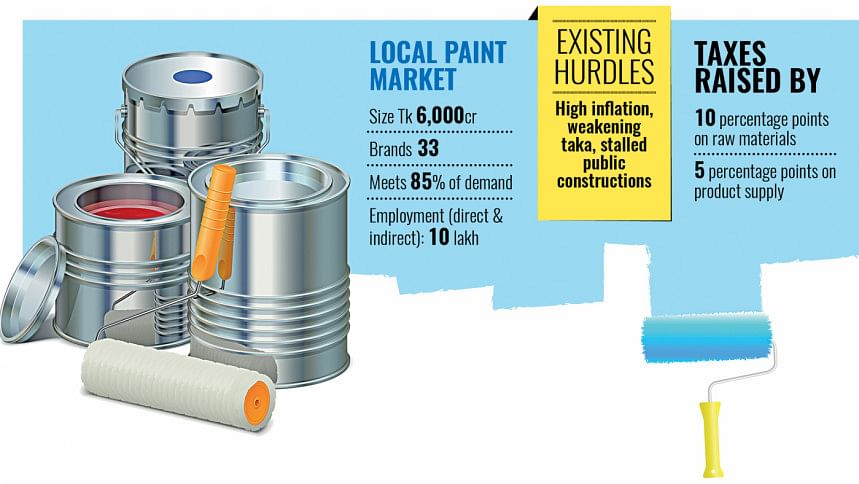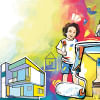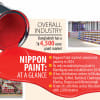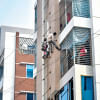Paint makers decry tax hikes as demand slumps

The local paint industry is reeling from increased supplementary duties (SD), which threaten both revenue and the survival of manufacturers amid rising production costs and shrinking consumer demand, according to industry insiders.
The National Board of Revenue (NBR) last week raised the SD on the import of paint and varnish-related raw materials to 30 percent from 20 percent. Moreover, the SD on product supply was increased to 10 percent from the previous 5 percent.
The Bangladesh Paint Manufacturers' Association (BPMA), a platform for local manufacturers, expressed concern over the tax increases and wrote to the revenue board on Sunday seeking a rate reduction.
The association argued that these duties, usually reserved for luxury goods, are unjustified for essential construction materials such as paints and primers, which are used to protect infrastructure from corrosion and erosion.
"Paint products are not luxury items," said Md Mohsin Habib Chowdhury, president of the paint makers' association. "They are essential for the structural integrity of assets, from homes to large-scale infrastructure," he said, adding, "The increased taxes are compounding the financial hurdles manufacturers already face."
The sector's existing challenges include persistently high inflation, a weakening Taka against the US dollar, and stalled public constructions after the political changeover last year.
The size of the local paint manufacturing industry is around Tk 6,000 crore, and it can meet the domestic demand, according to the association. As many as 33 local brands manufacture paint items for the domestic market. It contributes to government revenue by generating over Tk 1,100 crore annually in VAT and taxes, according to the association.
The industry also employs around 10 lakh people directly and indirectly.
According to an assessment by Berger Paints Bangladesh, per capita paint consumption in the country is 1.4 kg, lower than India's 3 kg. The annual consumption is 7-10 kg in ASEAN countries and 12 kg in China.
The assessment notes that about 85 percent of paints used in Bangladesh are manufactured locally, with the remainder relying on imports for specialised needs.
Kamruzzaman Kamal, marketing director at PRAN-RFL Group, which makes Rainbow Paints, said that while there is room for growth, higher taxes will discourage both consumers and businesses.
According to him, the recent increase in SD on paints impacts the paint and construction industries by raising prices, reducing consumer demand, and possibly slowing down economic growth.
Md Jahidul Hasan, manager (purchasing and logistics) at Nippon Paint Bangladesh, said higher taxes on paints come at a time when the paint industry is already reeling from global and domestic economic shocks.
The devaluation of the local currency Taka against the US dollar has increased import costs for raw materials, while supply chain disruptions due to geopolitical tensions have further strained resources, he said.
According to him, the real estate sector, a major consumer of paint products, is also experiencing a downturn, further reducing demand.
Meanwhile, inflation has eroded consumer purchasing power, making it difficult for manufacturers to adjust prices to offset rising costs, said Hasan.
For adjustment, he said manufacturers would have to increase product prices by at least 8 percent.
"We have tried to delay price hikes as much as possible, but the rising cost of production is unsustainable," said Chowdhury, president of the paint makers' association.
"Even with slight price increases, we are absorbing a portion of the cost, leading to shrinking profit margins," he said, claiming that many companies are now operating at a loss and some have already shut down.
But the increased SD has complicated the situation, adding to the financial burden faced by manufacturers, according to Chowdhury.
With production costs rising due to higher transportation, packaging, and distribution spending, the additional duty further erodes profitability, according to the paint manufacturers' association.
The association said it has requested the revenue board to remove the SD on locally manufactured paints.
The association warned that if local companies are forced to pay higher taxes, the consequences could include factory closures and job losses.
"The current scenario is unsustainable for local manufacturers," said Chowdhury. "If the government fails to resolve the issues, the industry risks losing its ability to compete, both domestically and internationally," he added.

 For all latest news, follow The Daily Star's Google News channel.
For all latest news, follow The Daily Star's Google News channel. 








Comments